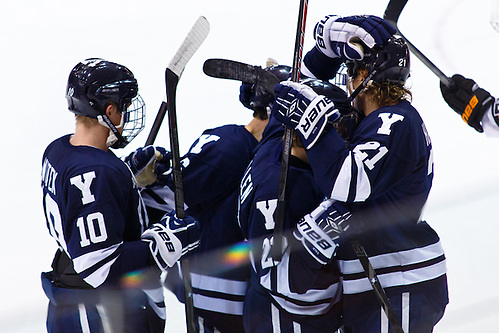
Each week, Tuesday Morning Quarterback looks at the big events and big topics in Division I men’s college hockey.
Jim: Well, Todd, we’re done with the first Beanpot Monday. And while four were looking to take home that coveted trophy, everyone else should be looking toward the finish line for the season.
I’ve always thought of the Beanpot as the beginning of a long downhill stretch for this journalist, and I assume the teams probably feel the calendar change to February bringing a similar meaning. With that in mind, pick out a couple of teams that really need to have a great month of February if they’re going to have a chance at calling this season successful.
Todd: I’ll start with the defending champion. Yale was just 3-3-1 in January and has slipped to sixth place in the ECAC Hockey standings. After losing to Cornell and beating Colgate last weekend, the Bulldogs are 20th in the PairWise Rankings. So if they don’t get things straightened out in February, they’re going to need a playoff championship to have the opportunity to defend their NCAA title.
There are a lot of teams in that bubble zone of the PairWise, but I think there has to be some concern about the way Notre Dame has played in the last few weeks. If the Fighting Irish can’t string together some wins, they will be in that dangerous area in March, where a playoff loss and other teams winning could leave them out of the big dance. What teams do you see needing a February boost?
Jim: Notre Dame is certainly at the top of my list for teams that need to get going. The Irish were hampered by injury earlier in the season but at this point they are relatively healthy and simply need to play better hockey. I also think I was beginning to have high expectations for Denver, but the Pioneers finished January 3-2-2 (after going 7-1-3 in their previous 11). Regardless, time is running out for these bubble teams if they’re going to make a move toward the postseason.
Last week, we talked a lot about the postgame brawl between Union and Rensselaer. When we wrote, the league had suspended a number of players but no suspensions were tacked on to Union coach Rick Bennett (who was suspended two games by his school) or RPI coach Seth Appert. In the middle of last week, the league announced an additional two-game suspension for Bennett (four total) and gave Appert a single game.
I saw this as pretty strange, making it seem like the ECAC reacted to negative commentary, maybe from other member institutions, to the original suspensions. Is that how you saw it?
Todd: I usually give the league offices a bit of leeway with suspensions after having heard what goes into some of the proceedings. We don’t know if a school protested and asked for a hearing, so maybe that delayed things.
But in the end, I think the weight of the coach penalties, especially to Bennett, was appropriate in light of what time of the season we’re entering. To me, game suspensions in February mean more than they do in October or November, even though those games carry the same weight when we’re talking PairWise. A team missing its coach for four games as the weeks left get short in the conference title race is significant. Do you think Appert got punished too harshly, too lightly or appropriately?
Jim: I think that giving Appert a single game seems fair. Even if not for his involvement in the altercation, coaches need to be responsible for their players, and neither coach had a lot of control over what happened on the ice that evening.
Speaking of suspensions and rules, Tuesday night on USCHO Live!, we’ll have some of the NCAA’s top rules experts to talk about rules and officiating in NCAA hockey. So here’s a question for you: If you could change or make one rule for the NCAA rule book, what would it be?
Todd: It’s a timely discussion because in last Friday’s shootout between Minnesota and Michigan State, the Spartans were denied a goal or a do-over of Joe Cox’s attempt after Gophers goaltender Adam Wilcox knocked the post off the pegs (unintentionally, it appeared) as the shot was being taken. The referees initially called it a goal but reversed the call after watching the replay, and I’m told it was because the puck crossed the goal line at where the post would have been. In other words, if the goal hadn’t been dislodged, the puck would have hit iron. Here’s the video:
[youtube_sc url=http://www.youtube.com/watch?v=7H92VbpwRTM]
Even if the officials ruled that the puck crossed the line at the post, if the net was in place that shot could have hit the post and rebounded into the net off of Wilcox’s leg. You just don’t know. So I’d like to see some language added allowing for a retry if the referees deem that it was impossible to tell whether a goal would have been scored after a goalie’s inadvertent dislodging of the net. A small rule, I’ll admit, but you never know when a point in the standings from a shootout can mean the difference between the title and second place. Do you have a rule change in mind?
Jim: I do have one in mind. This season the NHL decreased the depth of the net, which, in turn, has allowed more wraparound goals to be scored. The skill of wrapping around a puck isn’t rewarded much with the current nets because their depth makes it challenging for even the longest-armed players to get the puck around on the forehand without losing the leverage to score.
A shallower net, as we’ve seen in the NHL this season, would allow those skilled plays to happen more often. What do you think?
Todd: I don’t see any reason why that would hurt, other than in schools having to buy new goal cages. The other thing to consider is that a lot of college arenas still have the nets 15 feet from the end boards instead of the 11 feet in the NHL. So in a lot of rinks, there already is that extra space.
Maybe college rules should align with the NHL on where the lines sit, but then you have the difficulty of accommodating venues that are used for multiple levels.
Let’s look at this week’s schedule. We’ve got an unusual Thursday-Friday series kicking off the weekend when No. 12 Wisconsin hosts No. 1 Minnesota. The Badgers need to start winning on the road, but in the meantime they can at least delay the Gophers’ run toward the Big Ten title.
And in the NCHC, the logjam in the standings might start to shake out when first-place St. Cloud State hosts Denver, which is in a three-way tie for second place. Nebraska-Omaha and North Dakota, the other two parts of that second-place tie, get together in Grand Forks. What’s up out east?
Jim: In Hockey East, I think the series I look forward to the most is Vermont and New Hampshire. Both teams are playing well and are in strong contention for the first-round bye and/or home ice. Connecticut and Bentley should be another big series in Atlantic Hockey.
And there are a number of big games in the ECAC, with Quinnipiac traveling to Clarkson, Yale hosting Union, and Cornell facing Colgate on the road.


